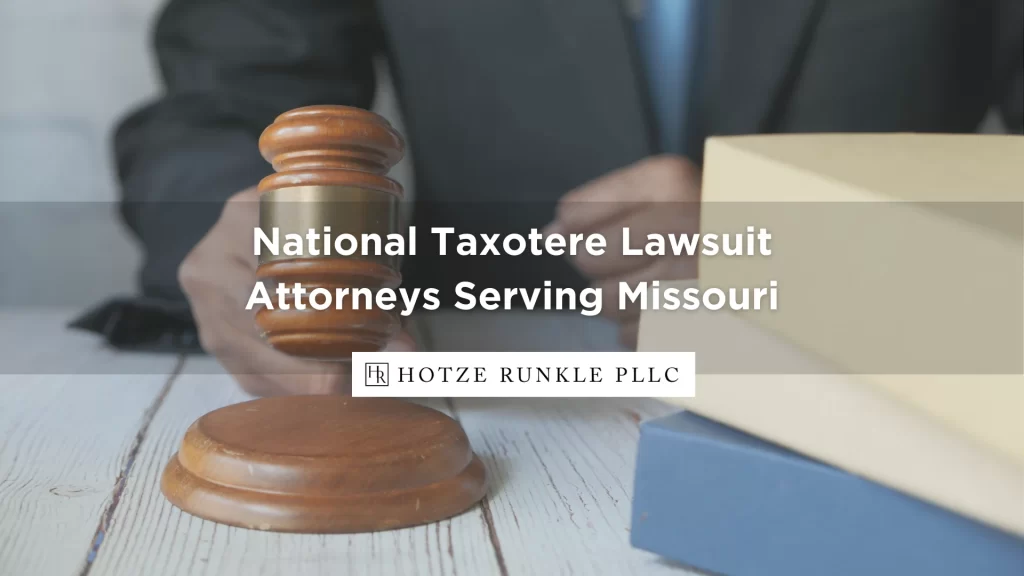
If you developed canalicular stenosis or suffered from other serious eye issues due to the chemotherapy drug Taxotere, Hotze Runkle PLLC can help. Our seasoned defective pharmaceutical attorneys represent individuals in Missouri and across the nation who were unaware of the severe side effects this drug could cause.
A common symptom Taxotere users notice during their chemo treatment is excessive eye-watering. The seemingly minor side effect is often an indicator of something more serious. Epiphora is an ocular condition that causes consistent watery eyes. In advanced stages, a diagnosis of canalicular stenosis is possible.
Canalicular Stenosis is a side effect of Taxotere experienced mainly by breast cancer survivors. The symptoms range from mild to severe, and onset typically occurs during chemotherapy. It starts with constant eye-watering and potentially develops into something permanent and irreversible.
Sanofi-Aventis created the drug over 25 years ago, and it’s successful in treating various cancers, including breast, lung, prostate, stomach, head, and neck. During trials, the manufacturer released findings that it effectively increased life expectancy and decreased the duration of treatment needed. It gets administered intravenously on a schedule of once a week, once every two weeks, or once every three weeks.
Hotze Runkle PLLC is currently representing breast cancer survivors around the country in lawsuits against Sanofi-Aventis. The thousands of Complaints filed cite the pharmaceutical company’s involvement in knowingly selling a drug that causes adverse reactions. For years, they marketed Taxotere without releasing all of the information regarding some severe side effects to the FDA. The drugmaker failed to notify doctors or patients about these issues and prevented them from making an informed decision about the treatment best for them.
Canalicular Stenosis: How Does it Develop and What Are the Symptoms?
During chemo with Taxotere, many individuals experience eye-watering associated with epiphora. It’s more than just a minor inconvenience. The symptom is chronic and interferes with routine tasks, such as reading and driving.
Canaliculi are vital eye structures that function as a passageway for tears to travel from the tear duct to the nasal cavity. When a canaliculus gets obstructed in any way, tears build up and exit from the eye in uncontrollable amounts. Chronic inflammation of the canaliculus leads to an infection. Canalicular Stenosis is an ocular condition that occurs when the obstructed canaliculus closes.
Medical researchers performed studies on Taxotere’s interaction with a patient’s tears. As the drug travels through the bloodstream, it mixes with various bodily fluids. The direct contact between secretions from Taxotere and tears cause inflammation to the canaliculus.
The results brought to light the potential dangers that breast cancer patients face. Most people brush off their symptoms as typical effects of their Taxotere treatment. They assume it’ll pass eventually. Unfortunately, symptoms continue to progress long after chemotherapy ends. Without necessary medical intervention, canalicular stenosis develops.
The most common symptoms reported from a diagnosis of canalicular stenosis include:
- Light sensitivity
- Watery eyes
- Blurry vision
- Cystoid macular edema (loss of areas of vision)
- Headaches
- Swollen eyelids
- Dry eyes
- Eye infections
Am I Eligible to Take Legal Action?
Experiencing symptoms of epiphora and canalicular stenosis alone don’t necessarily mean that you have a legal claim. You must be a current or former cancer patient who underwent chemo treatment with Taxotere. Whether your regimen was weekly or every three weeks, you could qualify for a lawsuit.
To file suit against any company, the circumstances of a case must fall under one of three categories. Those categories are:
- Liability: The product caused an injury or damage to the claimant, whether by product design, a defect, or insufficient warnings.
- Negligence: The manufacturer knew or should have known that its product was dangerous or defective.
- Breach of Warranty: The product caused injury during its intended use by the consumer.
If you underwent Taxotere treatment and suffered any symptoms not disclosed by Sanofi-Aventis, you might qualify for a lawsuit. The company’s lack of effort to prevent harm to its consumers is an outrageous injustice. They sold a drug to treat a debilitating disease but prioritized their profits over the well being of patients. That lack of concern justifies breast cancer patients and survivors to seek financial compensation.
Is Canalicular Stenosis Curable?
In the early stages where individuals only experience symptoms of epiphora, there are treatment options. Consistent evaluation by an ophthalmologist and the use of eye drops could help to manage eye-watering. A topical steroid is also useful in reducing inflammation of the canaliculi and preventing it from closing. However, in cases of severe Canalicular Stenosis, surgical intervention might be necessary.
DCR, dacryocystorhinostomy, is a procedure to construct a new passageway for tears to travel. The surgeon drills a hole in the bone adjacent to the canaliculus for tears to funnel into the nasal cavity. For some people, the placement of a stent might be necessary to facilitate drainage. When performed successfully, it’s effective in redirecting the tears around the obstructed canaliculus and managing unruly symptoms.
If the damage to one or both canaliculi is too severe to perform DCR, CDCR, conjunctivodacryocystorhinostomy, is a possible option. Like DCR, CDCR aims to create a new structure for tears to pass through into the nasal cavity. Instead of reconstructing the damaged canaliculi, a glass tube called a Jones tube gets inserted.
All surgeries come with risks. Any of the following problems could arise after undergoing either procedure:
- Uncontrollable bleeding
- Tissue damage
- Significant and permanent facial scars
- Rejection of the Jones tube by the body
- Further eye infections
- Blindness
- Sinusitis
- Migration of the Jones tube within the body
- Ineffective results
You must notify your oncologist of any unusual symptoms while receiving Taxotere. You could request a referral to an ophthalmologist to determine a possible diagnosis of canalicular stenosis. The sooner you treat your symptoms, the less likely you’ll have to deal with them for the rest of your life.
Do I Need a Lawyer to File a Lawsuit?
 If you’re considering filing a lawsuit against Sanofi-Aventis, you should speak with a lawyer from Hotze Runkle PLLC. If you’re unfamiliar with the legal process, you won’t know what evidence you need or the strict deadlines for filing. Additionally, the opposing party might try to take advantage of you by offering a settlement much lower than you deserve.
If you’re considering filing a lawsuit against Sanofi-Aventis, you should speak with a lawyer from Hotze Runkle PLLC. If you’re unfamiliar with the legal process, you won’t know what evidence you need or the strict deadlines for filing. Additionally, the opposing party might try to take advantage of you by offering a settlement much lower than you deserve.
Under Missouri law, there’s a five-year statute of limitations for product liability cases. That means you have five years from the date of injury to bring legal action against the pharmaceutical company. If three years pass, you lose your right to seek compensation directly from the company.
There are also laws dictating the amount of your financial award if you win your case. The compensation you receive reimburses you for any expenses you incurred as a result of your injury. However, defense attorneys require vital pieces of evidence to justify the amount of money you’re demanding. An experienced attorney knows how to find proof that Taxotere caused your diagnosis. We’ll evaluate all the details of your case to determine a full and fair settlement.
How Much is My Case Worth?
The amount of damages you could seek depends on five factors. If you only experienced minor symptoms that required minimal treatment, you might not receive that much money. In situations involving invasive surgery and many months of recovery, you could seek the highest compensation available. The factors used to determine how much your case is worth include the following:
- The severity of the injury;
- Duration of treatment;
- Required surgery and its invasiveness;
- Time away from your job; and
- Effect of the injury on your lifestyle
Damages are losses suffered as a direct result of an accident or injury. They fall under three separate categories: economic, noneconomic, and punitive. In the state of Missouri, you could seek compensation for damages, including:
- Medical Bills: The total cost of medical expenses, such as physical therapy, prescription medications, surgeries, and ER visits.
- Loss of income: Income you couldn’t earn, including lost paid time off, bonuses, commissions, and promotions.
- Future earning capacity: Any physical limitations that prevent you from returning to work or performing the job to its full requirements.
- Pain and Suffering: Physical pain and discomfort directly caused by the injury.
- Emotional distress: Psychiatric treatment resulting from the incident, such as the diagnosis of anxiety or depression.
- Wrongful death: Compensation paid to the victim’s loved ones if the injury resulted in death.
- Loss of companionship or consortium: Damages for the negative impact of an immediate family member’s relationship with the injured party.
- Punitive damages: Financial damages awarded to the plaintiff as a means of punishing the defendant, rather than reimbursement for expenses.
It’s difficult to determine an exact number in any case; however, your attorney generally demands an amount to cover all your past and future expenses. The goal is to ensure no costs become your financial responsibility. Sanofi should suffer the consequences of their careless actions and hold the blame by compensating you for all damages resulting from your canalicular stenosis.
How Can the Taxotere Lawyers from Hotze Runkle PLLC Help Me?
Hotze Runkle PLLC takes on complex cases to seek justice for those victimized by pharmaceutical companies like Sanofi. We use all the resources at our disposal to fight for individuals like you. When you hire us, we’ll approach your case with the intention to meet and exceed your goals. We never pressure anyone into making a decision they’re not ready to make. We’ll advise you on your options and guide you towards the one that fulfills your expectations.
It’s important to us that we provide superior customer service at all times. We’ll treat you with respect, professionalism, and compassion every time you speak with us. We believe in creating a safe space, so our clients feel comfortable when visiting our offices. We work efficiently to resolve your case promptly so you can get your life back.
All prospective clients receive a free consultation with one of our dedicated attorneys. There’s no risk or obligation to meet with us so we can review the details of your circumstances and determine if we can move forward with it.
To see if you or your loved one qualifies for a Taxotere lawsuit against Sanofi, fill out our Case Evaluation.